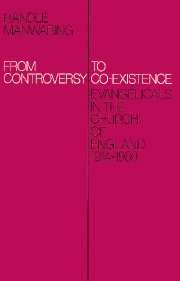Book contents
- Frontmatter
- Contents
- Acknowledgements
- Preface
- 1 Into battle
- 2 The defensive years
- 3 Through the Waste Land
- 4 Continuing nadir
- 5 The turning tide
- 6 Towards the conversion of many
- 7 Flood-tide of Evangelism
- 8 Anatomy of Evangelicalism
- 9 The Fundamentalist issue
- 10 The hard facts of Evangelicals and unity
- 11 The Honest to God debate
- 12 Liturgical debates
- 13 Charismatic differences
- 14 Keele – a watershed
- 15 Evangelical identity – a problem
- Notes
- Index
6 - Towards the conversion of many
Published online by Cambridge University Press: 18 September 2009
- Frontmatter
- Contents
- Acknowledgements
- Preface
- 1 Into battle
- 2 The defensive years
- 3 Through the Waste Land
- 4 Continuing nadir
- 5 The turning tide
- 6 Towards the conversion of many
- 7 Flood-tide of Evangelism
- 8 Anatomy of Evangelicalism
- 9 The Fundamentalist issue
- 10 The hard facts of Evangelicals and unity
- 11 The Honest to God debate
- 12 Liturgical debates
- 13 Charismatic differences
- 14 Keele – a watershed
- 15 Evangelical identity – a problem
- Notes
- Index
Summary
The old liberalism, through rinsings of humanism represented by a mixture of the League of Nations, St Martin-in-the-Fields and the ideologies of dictatorship, was by the end of the Second World War, largely discredited. Writing at the height of the conflict and then ignorant of atomic bombs, D. R. Davies made an interesting prophecy regarding the European Economic Community and spelt out the endless human dilemma:
The world never stands still nor remains the same. Being a dynamic creature, man will invent new social structures. This will happen anyhow. But the new structure, like all the others, will prove to be temporary. Like all the others, it will contain within itself the seeds of its own destruction. The new order in Europe will be another makeshift solution of man's problem. In no sense will it be a radical solution. Of course, it is important that Europe should discover the best makeshift that is historically possible. European federation of independent sovereign states will be infinitely better than German hegemony. A regional organisation of Europe would be still better than federation of sovereignties. All this is of great importance, and the Church should do all in her power to bring about the best possible
Any consideration of theology and the Christian Church in Britain in the post-war era must include some reference to the indirect influence of German pastors and theologians, for the Christian Church in Nazi Germany had experienced a baptism of fire and had to re-think its position.
- Type
- Chapter
- Information
- From Controversy to Co-ExistenceEvangelicals in the Church of England 1914–1980, pp. 73 - 84Publisher: Cambridge University PressPrint publication year: 1985



